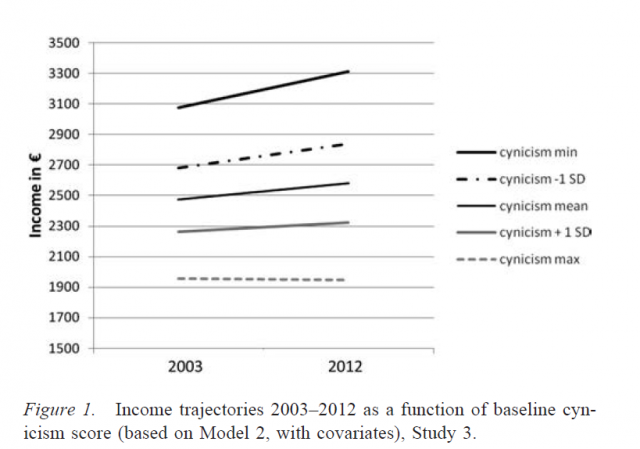Low Salary? Your Cynical Attitude May Be To Blame
by Ravindra Krishnamurthy

“Are most people good, honest and trustworthy or are they egoistic, deceitful, and evil?” Your answer to this question may decide your future income.
Am I joking? Well, no. According to a new research study published in the Journal of Personality and Social Psychology, cynical attitude towards associates not only brings down an individual’s physical and mental health but also his personal wealth. Survey data collected from two continents clearly bring out the fact that cynical people wind up receiving smaller pay checks.
“It is the first study that examined the effect of cynical beliefs on income longitudinally across different cultural contexts,” says lead author Dr. Olga Stavrova from University of Cologne, Germany. “And it concludes that, holding cynical beliefs about human nature is likely to hinder one’s financial success.”
Previous studies have shown that cynical distrust has negative impact not only on the social life but also on the individual’s physical and mental health. Often reporting lack of positive mood and frequently falling to long depressions, cynical individuals provide and receive less social support, resulting in unsatisfactory married life and higher conflict with family members.
Their physical health too takes a beating. Many start to accumulate fat and become obese, build resistance to insulin, and develop coronary heart diseases and dementia, which can lead to increased mortality.
In order to understand the impact of cynicism on an individual’s income, researchers analyzed five different data-sets of nationally representative samples from US, Germany and 41 European countries.
In the first study, survey data from 1146 Americans were collected in 2002 and again in 2011, after a gap of 9 years. In another survey, 497 US citizens provided the data, collected in the years 2010 and 2012.
In both these surveys, participants were asked to provide their total income, along with that of their spouses; and to measure their level of cynicism, they were asked to respond to questions like, “Generally speaking, would you say that most people can be trusted, or that you cannot be too careful in dealing with people?” and “Do you think that most people would try to take advantage of you if they got the chance, or would they try to be fair?”
Data analysis from the two studies shows a strong association of high levels of cynicism with lower income; individuals who endorse cynical beliefs about human nature end up making less money. Also, researchers observed that individual differences in health and education did not account for the negative effect of cynicism on income growth.
In a third study, in order to explore whether cynical individuals have a different income development trajectory compared with their idealist counterparts, researchers collected survey data from approximately 16,000 Germans. After nine years of observation (2003–2012), they found that the least cynical individuals’ income increased on average by $300 per month, while among the most cynical participants, any increase was insignificant.

In the last study, to check whether the association between cynical beliefs and income depended on a country’s sociocultural climate, researchers closely examined survey data from 41 countries in Europe. The analysis of the survey data revealed that, in countries with a high societal cynicism, high rates of antisocial and low rates of pro-social behaviors, cynical beliefs about the human nature are warranted and individuals holding these views are not worse off financially than their less cynical counterparts.
As Dr. Stavrova explains, “There are actually some countries, where cynical individuals do not necessarily earn less than their less cynical compatriots. In particular, these countries are those with pervasively high societal cynicism scores, rare pro-social behavior like charity donations and widespread antisocial behavior as indicated by high homicide rates — in other words, countries where cynicism might be justified and or even somewhat functional.” She adds, “In contrast, in countries with comparatively high rates of pro-social behavior, low levels of antisocial behavior and low societal cynicism, cynical individuals earned lower incomes.”
Researchers believe they understand the underlying mechanism and the possible reason for these findings. They speculate that cynical persons distrust fellow human beings and refrain from cooperative opportunities. Their unwillingness to rely on others seriously handicaps them in living and working in a social world. They most likely suspect mean motives behind other people’s behavior, abstain from joining collaborative efforts and likely shun asking for help even when needed, which may eventually sabotage their economic success.
In addition, researchers feel, cynical employees excessively spend resources on protecting themselves from potential exploitation and deception, and also they pay more attention to ‘covering their backs’ instead of focusing on their jobs. Similarly, cynical managers distrust their subordinates and over-invest in control and supervision, which, in the long run, may jeopardize their business success.
But this proposed mechanism, that cynical beliefs are associated with economic drawbacks, holds only if these beliefs are unjustified and most people are actually trustworthy, honest, and kind most of the time. In countries with high societal cynicism where ‘dog eats dog’ mentality prevails, the individual’s cynical beliefs are justified and such beliefs might in fact help prevent financial losses because of fraud and deception.
Everyone strives for job satisfaction and economic success, as they provide psychological comfort and a sense of well being. This research finding helps in reaching these objectives by encouraging people to adopt a more compassionate and kindly view of human nature and trustful attitude towards their fellow human beings.
As Dr. Stavrova points out, “We believe that adopting a more idealist, open perspective toward other people will typically not result in exploitation and deceit but is likely to literally pay off.”
Most people, Stavrova’s research tells us, are actually kind, honest and trustworthy. By overpowering cynical beliefs and strengthening trust in mankind, we can boost our financial well-being by reaping the benefits of mutual cooperation and joint efforts. Even in countries with a rather harsh social climate involving deception and fraud, a positive idealistic view of human nature is likely to help rather than hurt.
Ravindra Krishnamurthy is a freelance science writer covering science, tech, environment, health, food and culture. His articles have appeared in permaculturenews (Australia) and Earth Island Journal (US). For published articles please visit his portfolio.
Support The Billfold
The Billfold continues to exist thanks to support from our readers. Help us continue to do our work by making a monthly pledge on Patreon or a one-time-only contribution through PayPal.
Comments